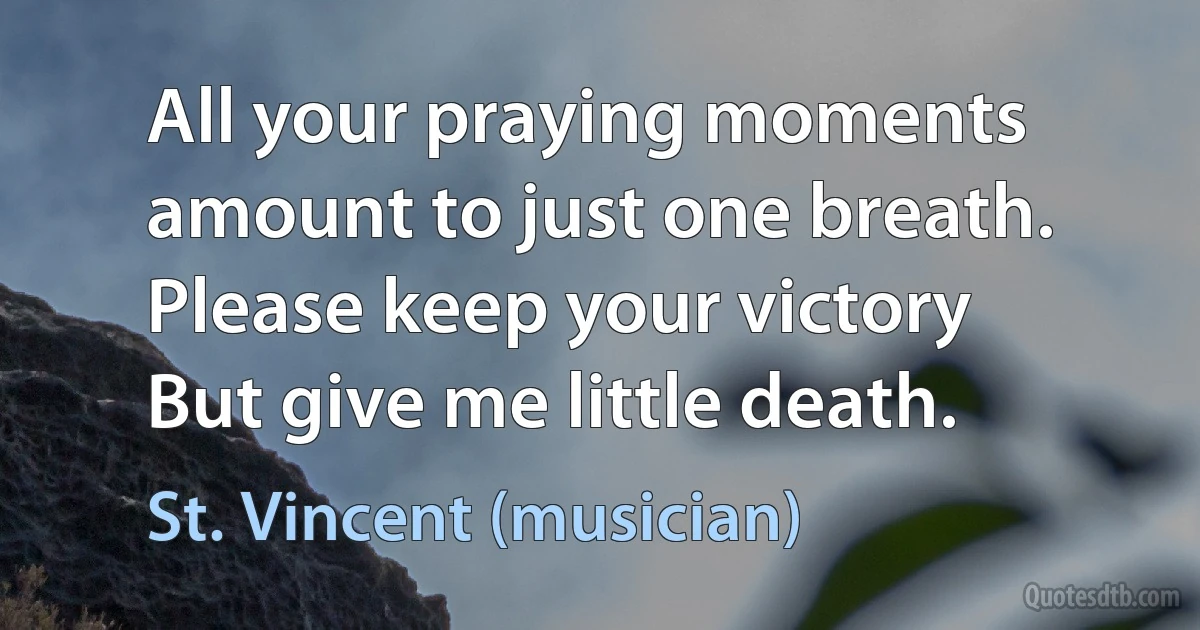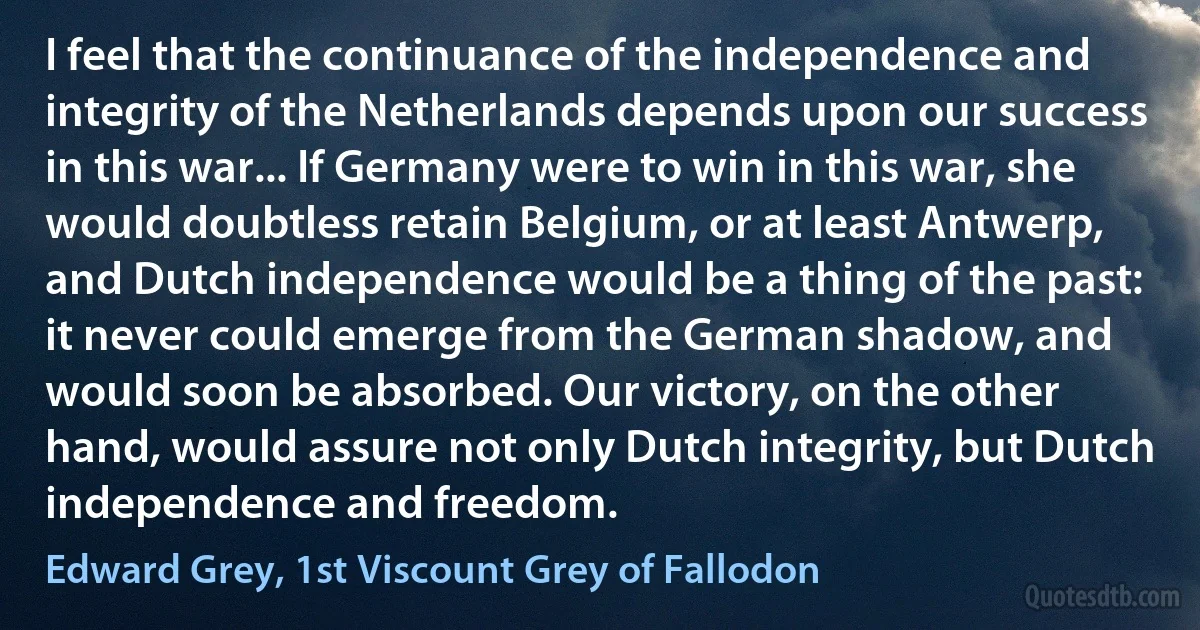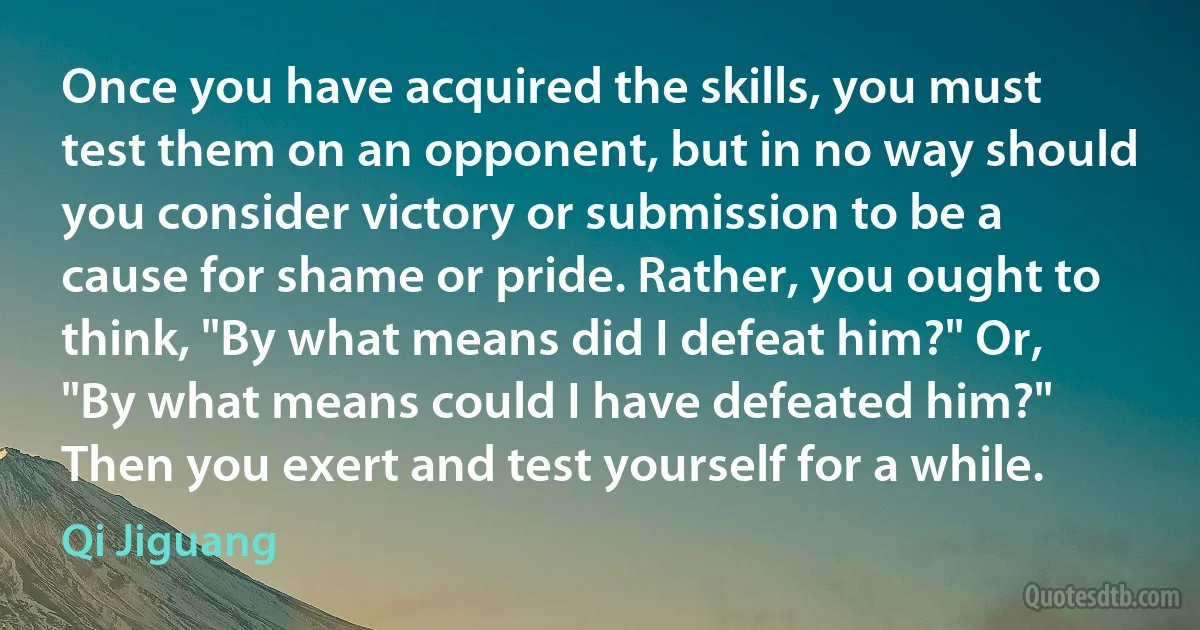Victory Quotes - page 53
The North is fighting for no sentimental cause-for no victory of a 'higher civilization'. It is fighting for a very ancient and vulgar object of war-for that which Russia has secured in Poland-that which Austria clings to in Venetia-that which Napoleon sought in Spain. It is a struggle for empire, conducted with a recklessness of human life which may have been paralleled in practice, but has never been avowed with equal cynicism. If any shame is left in the Americans, the first revision they will make in their constitution will be to repudiate formally the now exploded doctrine laid down in the Declaration of Independence, that 'Governments derive their just powers from the consent of the governed'.

Robert Gascoyne-Cecil, 3rd Marquess of Salisbury
These new soldiers, drawn from the civil population, have displayed a valour equal to that of their ancestors, who have carried the flag of Britain to victory in so many lands in bygone times... Not less prompt was the response, not less admirable the devotion to the common cause, of those splendid troops which eagerly hastened to us from the Dominions overseas, men who showed themselves more than ever to be bone of our bone, inheriting all the courage and tenacity that have made Britain great. A hundred battlefields in all parts of the world have witnessed their heroism, have been soaked with their blood, and are for ever hallowed by their graves.

George V of the United Kingdom
No one talks about when he did the Victory tour, I remember as a kid Michael being on tour with the Victory tour right? And every night on the news they would announce that Michael Jackson donated his money from every city that he did, he donated it to a new charity. He donated his money from the Victory tour to charities. I thought that was amazing. I'm like, wow! This guy's donating millions of dollars every night to a new charity. Then he would stop in every city and every city he would stop at a hospital and visit kids that were burned, ill or whatever. He took the time to do all that.

Michael Jackson
I thought back over my life. How does a man come to climb mountains? Is he drawn by the heights because he is afraid of the level land? Is he such a misfit in the society of men that he must flee and try to place himself above it? The way up is long and difficult, but if he succeeds they must grant him a garland of sorts. And if he falls, this too is a kind of glory. To end, hurled from the heights to the depths in hideous ruin and combustion down, is a fitting climax for the loser-for it, too, shakes mountains and minds, stirs things like thoughts below both, is a kind of blasted garland of victory in defeat, and cold, so cold that final action, that the movement is somewhere frozen forever into a statuelike rigidity of ultimate intent and purpose thwarted only by the universal malevolence we all fear exists. An aspirant saint or hero who lacks some necessary virtue may still qualify as a martyr, for the only thing that people will really remember in the end is the end.

Roger Zelazny
Building alibis is a deeply rooted habit. Habits are difficult to break, especially when they provide justification for something we do. Plato had this truth in mind when he said, The first and best victory is to conquer self. To be conquered by self is, of all things, the most shameful and vile.

Napoleon Hill
Conflict situations are driven by concepts of victory, power, and elimination of inherited culture, and not by the underlying values of civilization. There are many interpretations of Islam within the wider Islamic community, but generally we are instructed to leave the world a better place than it was when we came into it.The Aga Khan Award for Architecture seeks to make a better place in physical terms. This means trying to bring values into environments, buildings, and contexts that improve the quality of life for future generations.

Aga Khan IV
If, in the middle of World War II, a general could be writing a poem, then maybe I was not so irrelevant after all. Maybe the general was doing more for victory by writing a poem than he would be by commanding an army. At least, he might be doing less harm. By applying the same logic to my own condition, I decided that I might be relevant in what I called a negative way. I have clung to this concept ever since - negative relevance. In moments of vain-glory I even entertain the possibility that if my concept were more widely accepted, the world might be a better place to live in. There are a lot of people who would make better citizens if they were content to be just negatively relevant.

Robert Penn Warren
We have secured for Uganda the pax Britannica which has been so beneficial in India... What existed in Uganda at that time were anarchy and civil war of the worst kind. If we had not been there thousands and perhaps hundreds of thousands of people would have been cruelly massacred; and after the victory of one party or the other what remained of the minority would have been cruelly tortured to death.

Joseph Chamberlain
You are assuming that I wish to be popular. I don't care. I do care that millions of people may die needlessly for an essentially identical outcome.
Russia is doing partial mobilization. They go to full war mobilization if Crimea is at risk. Death on both sides will be devastating.
Russia has >3 times population of Ukraine, so victory for Ukraine is unlikely in total war. If you care about the people of Ukraine, seek peace.

Elon Musk
It is the duty of all who care for their country or for civilisation to point out that we cannot further any of our ideals by participation in the next war, and that we ought therefore to resist all measures based upon the assumption that we shall take part in it. In the late war it was arguable that victory, being possible, might do some good. With the modern technique of gas attack, no belligerent can hope for victory. Absolute pacifism, therefore, in every country, in which it is politically possible, is the only sane policy both for Governments and individuals.

Bertrand Russell
The father is against the son, the brother against the brother: and, Lord, with what conscience!
O be thou merciful unto us, and in thine anger remember thy mercy; suffer thyself to be entreated; be reconciled unto us; nay, reconcile us unto thee. O thou God of justice, judge justly. O thou Son of God, which earnest to destroy the works of Satan, destroy his furors, now smoking, and almost set on fire in this realm. We have sinned; we have sinned: and therefore thou art angry. O be not angry for ever. Give us peace, peace, peace in the Lord. Set us to war against sin, against Satan, against our carnal desires; and give us the victory this way.
This victory we obtain by faith. This faith is not without repentance, as her gentleman usher before her: before her, I say, in discerning true faith from false faith, lip-faith, Englishmen's faith: for else it springs out of true faith.

John Bradford
Neutrality toward Spinoza set in once one was able to admit that the "modern worldview," whose victory was decisively aided by Spinoza's metaphysics, does not, or does not entirely, coincide with this metaphysics. But even at this stage it was still generally maintained, and even emphasized, that among the three great Western philosophers of the seventeenth century - Descartes, Hobbes, and Spinoza - Spinoza was the most important one because, he was the most progressive one. He alone had drawn certain consequences from the foundations of modern philosophy, which became fully clarified only in the nineteenth century and which henceforth determined the general consciousness.

Baruch Spinoza
And the press freedom fear here is that the prosecution of Assange, and even the indictment itself, will deter journalism that is important and necessary and that should be regarded as protected by the First Amendment. And I think that this ruling is, again, a victory for Assange, but insofar as it's an endorsement of the U.S.'s prosecution theory and of the underlying indictment, I think that that indictment is going to continue to cast a kind of shadow over investigative journalism.

Julian Assange
...The rise, triumph, and victory of Spinozism in Europe are reminiscent of the power of ancient Buddhism because both are religiosity rather than philosophy. Spinozism is religion even when it operates with bizarre formulas. Its starting-point is a dead God, who is reminiscent of Buddha's Brahma. It is man's metaphysical fear and not the idea of a living God which is the driving force in religiosity. True religiosity is not an understanding of how God is correlated to man and to the world but the feeling of man's insignificance in the cosmos, giving birth to a state of meekness, humbleness, compassion, and pity. Only when man is crushed and overwhelmed by the thought of his insignificance in this vast universe does he become truly religious. These feelings are as present in Spinozism as they are in Buddhism.

Baruch Spinoza
After it hath been seen how the obstinate and the ignorant of evil disposition are accustomed to dispute, it will further be shewn how disputes are wont to conclude; although others are so wary that without losing their composure, but with a sneer, a smile, a certain discreet malice, that which they have not succeeded in proving by argument - nor indeed can it be understood by themselves - nevertheless by these tricks of courteous disdain they pretend to have proven, endeavouring not only to conceal their own patently obvious ignorance but to cast it on to the back of their adversary. For they dispute not in order to find or even to seek Truth, but for victory, and to appear the more learned and strenuous upholders of a contrary opinion. Such persons should be avoided by all who have not a good breastplate of patience.

Giordano Bruno
Aye, after victory, the crown;
Yet through the fight no word of cheer;
And what would win and what go down
No word could help, no light make clear.
A thousand ages onward led
Their joys and sorrows to that hour;
No wisdom weighed, no word was said,
For only what we were had power.

George William Russell
Night hung its blue over the garden. Satan fell asleep. He had a dream, and in that dream, soaring over the earth, he saw it covered with angels in revolt, beautiful as gods whose eyes darted lightning. And from pole to pole one single cry, formed of a myriad cries, mounted towards him, filled with hope and love. And Satan said:
"Let us go forth! Let us seek the ancient adversary in his high abode." And he led the countless host of angels over the celestial plains. And Satan was cognizant of what took place in the heavenly citadel. When news of this second revolt came thither, the Father said to the Son:
"The irreconcilable foe is rising once again. Let us take heed to ourselves, and in this, our time of danger, look to our defences, lest we lose our high abode."
And the Son, consubstantial with the Father, replied:
"We shall triumph under the sign that gave Constantine the victory."

Anatole France
Liberty means, not the mere voting at elections, but the free and fearless exercise of the mental faculties, and that self-possession which springs out of well-reasoned opinions and consistent practice. It is for them to honour principles rather than men - to commemorate events rather than days; when they rejoice, to know for what they rejoice, and to rejoice only for what has brought, and what brings, peace and happiness to men. The event we commemorate this day has procured much of both, and shall procure, in the onward course of human improvement, more than we can now conceive of. For this - for the good obtained, and yet in store for our race - let us rejoice! But let us rejoice as men, not as children - as human beings, rather than as Americans - as reasoning beings, not as ignorants. So shall we rejoice to good purpose and in good feeling; so shall we improve the victory once on this day achieved, until all mankind hold with us the jubilee of independence.

Frances Wright
The tactical result of an engagement forms the base for new strategic decisions because victory or defeat in a battle changes the situation to such a degree that no human acumen is able to see beyond the first battle. In this sense one should understand Napoleon's saying: "I have never had a plan of operations."
Therefore no plan of operations extends with any certainty beyond the first contact with the main hostile force.

Helmuth von Moltke the Elder
... Assad's survival-if Saddam Hussein's murderous rampage in 1991 is any indication-will without a shadow of a doubt translate into hundreds of thousands of Syrian dead, mostly butchered after his victory has been assured. The comparison comes to mind because the two Ba'thi regimes of Saddam Hussein and Bashar Assad bear an unmistakable resemblance-they are mirror images of one another, one might say. Both are minority dominated, single party regimes originating in the same quasi-fascist pan-Arab ideology built on the principle that any form of disagreement is an act of "betrayal” to the "revolution.”.

Bashar al-Assad
Other Venetians may, in one or the other way, more irresistibly enlist our sympathies, or may shine out for the moment more brilliantly in some special branch of their art; yet, after all, we find ourselves invariably comparing them to Titian, not Titian to them, taking him as the standard for the measurement of even his greatest contemporaries and successors. ..
.He is the greatest painter of the sixteenth century, just because, being the greatest colorist of the higher order, and in legitimate mastery of the brush second to none, he makes the worthiest use of his unrivaled accomplishment, not merely to call down the applause due to supreme pictorial skill and the victory over self-set difficulties, but, above all, to give the fullest and most legitimate expression to the subjects which he presents, and through them to himself.

Titian



